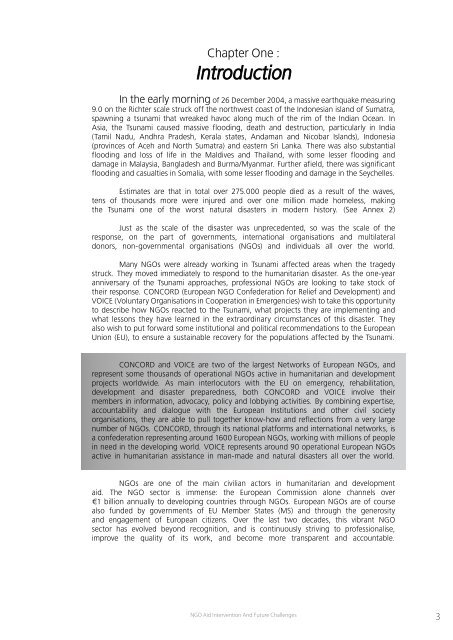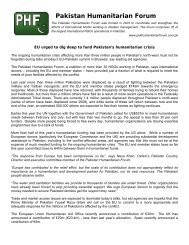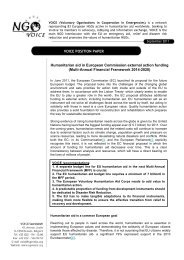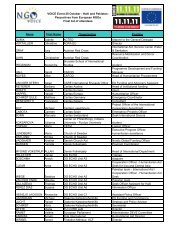Tsunami one year after, NGO aid intervention and future ... - VOICE
Tsunami one year after, NGO aid intervention and future ... - VOICE
Tsunami one year after, NGO aid intervention and future ... - VOICE
Create successful ePaper yourself
Turn your PDF publications into a flip-book with our unique Google optimized e-Paper software.
Chapter One :<br />
Introduction<br />
In the early morning of 26 December 2004, a massive earthquake measuring<br />
9.0 on the Richter scale struck off the northwest coast of the Ind<strong>one</strong>sian isl<strong>and</strong> of Sumatra,<br />
spawning a tsunami that wreaked havoc along much of the rim of the Indian Ocean. In<br />
Asia, the <strong>Tsunami</strong> caused massive flooding, death <strong>and</strong> destruction, particularly in India<br />
(Tamil Nadu, Andhra Pradesh, Kerala states, Andaman <strong>and</strong> Nicobar Isl<strong>and</strong>s), Ind<strong>one</strong>sia<br />
(provinces of Aceh <strong>and</strong> North Sumatra) <strong>and</strong> eastern Sri Lanka. There was also substantial<br />
flooding <strong>and</strong> loss of life in the Maldives <strong>and</strong> Thail<strong>and</strong>, with some lesser flooding <strong>and</strong><br />
damage in Malaysia, Bangladesh <strong>and</strong> Burma/Myanmar. Further afield, there was significant<br />
flooding <strong>and</strong> casualties in Somalia, with some lesser flooding <strong>and</strong> damage in the Seychelles.<br />
Estimates are that in total over 275.000 people died as a result of the waves,<br />
tens of thous<strong>and</strong>s more were injured <strong>and</strong> over <strong>one</strong> million made homeless, making<br />
the <strong>Tsunami</strong> <strong>one</strong> of the worst natural disasters in modern history. (See Annex 2)<br />
Just as the scale of the disaster was unprecedented, so was the scale of the<br />
response, on the part of governments, international organisations <strong>and</strong> multilateral<br />
donors, non-governmental organisations (<strong>NGO</strong>s) <strong>and</strong> individuals all over the world.<br />
Many <strong>NGO</strong>s were already working in <strong>Tsunami</strong> affected areas when the tragedy<br />
struck. They moved immediately to respond to the humanitarian disaster. As the <strong>one</strong>-<strong>year</strong><br />
anniversary of the <strong>Tsunami</strong> approaches, professional <strong>NGO</strong>s are looking to take stock of<br />
their response. CONCORD (European <strong>NGO</strong> Confederation for Relief <strong>and</strong> Development) <strong>and</strong><br />
<strong>VOICE</strong> (Voluntary Organisations in Cooperation in Emergencies) wish to take this opportunity<br />
to describe how <strong>NGO</strong>s reacted to the <strong>Tsunami</strong>, what projects they are implementing <strong>and</strong><br />
what lessons they have learned in the extraordinary circumstances of this disaster. They<br />
also wish to put forward some institutional <strong>and</strong> political recommendations to the European<br />
Union (EU), to ensure a sustainable recovery for the populations affected by the <strong>Tsunami</strong>.<br />
CONCORD <strong>and</strong> <strong>VOICE</strong> are two of the largest Networks of European <strong>NGO</strong>s, <strong>and</strong><br />
represent some thous<strong>and</strong>s of operational <strong>NGO</strong>s active in humanitarian <strong>and</strong> development<br />
projects worldwide. As main interlocutors with the EU on emergency, rehabilitation,<br />
development <strong>and</strong> disaster preparedness, both CONCORD <strong>and</strong> <strong>VOICE</strong> involve their<br />
members in information, advocacy, policy <strong>and</strong> lobbying activities. By combining expertise,<br />
accountability <strong>and</strong> dialogue with the European Institutions <strong>and</strong> other civil society<br />
organisations, they are able to pull together know-how <strong>and</strong> reflections from a very large<br />
number of <strong>NGO</strong>s. CONCORD, through its national platforms <strong>and</strong> international networks, is<br />
a confederation representing around 1600 European <strong>NGO</strong>s, working with millions of people<br />
in need in the developing world. <strong>VOICE</strong> represents around 90 operational European <strong>NGO</strong>s<br />
active in humanitarian assistance in man-made <strong>and</strong> natural disasters all over the world.<br />
<strong>NGO</strong>s are <strong>one</strong> of the main civilian actors in humanitarian <strong>and</strong> development<br />
<strong>aid</strong>. The <strong>NGO</strong> sector is immense: the European Commission al<strong>one</strong> channels over<br />
€1 billion annually to developing countries through <strong>NGO</strong>s. European <strong>NGO</strong>s are of course<br />
also funded by governments of EU Member States (MS) <strong>and</strong> through the generosity<br />
<strong>and</strong> engagement of European citizens. Over the last two decades, this vibrant <strong>NGO</strong><br />
sector has evolved beyond recognition, <strong>and</strong> is continuously striving to professionalise,<br />
improve the quality of its work, <strong>and</strong> become more transparent <strong>and</strong> accountable.<br />
<strong>NGO</strong> Aid Intervention And Future Challenges<br />
3






